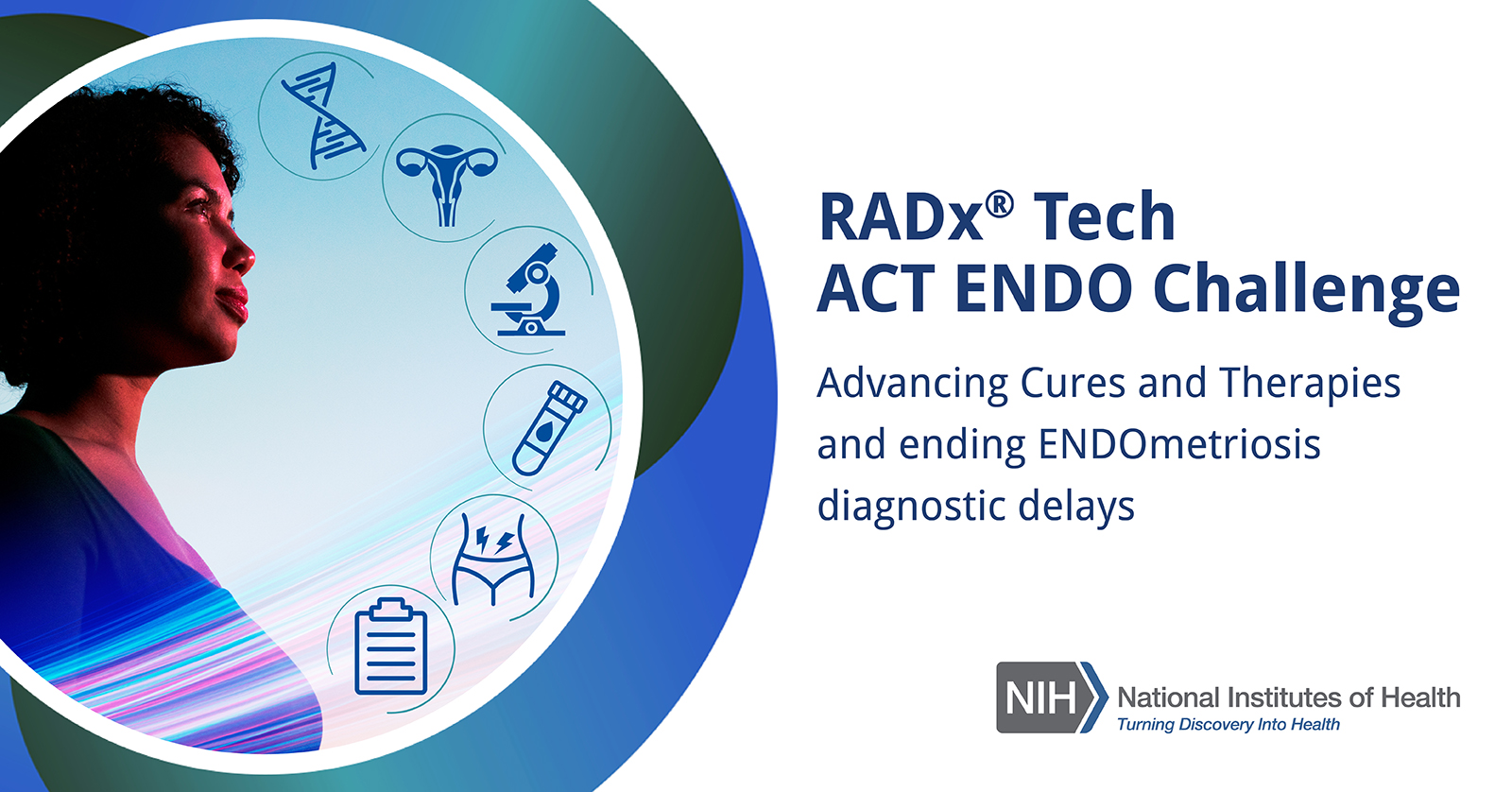Challenge seeks new technologies and broader accessibility to improve women’s health

The National Institutes of Health is offering up to $3 million in cash prizes to accelerate development of non-invasive technologies to improve diagnosis of endometriosis—a common and often debilitating gynecological disease. The RADx® Tech ACT ENDO Challenge seeks to shorten the time to diagnosis, eliminate the invasiveness of current techniques, and/or improve accessibility, safety, convenience and costs of diagnosis. NIH’s Eunice Kennedy Shriver National Institute of Child Health and Human Development (NICHD) and National Institute of Biomedical Imaging and Bioengineering (NIBIB) are co-leading the challenge.
“Endometriosis is one of the most common gynecological diseases, but it can take up to 10 years to get a diagnosis,” said Diana W. Bianchi, M.D., NICHD Director. “The goal of this challenge is to make a meaningful impact for the millions—roughly 10 percent globally—of reproductive-age women and girls who have endometriosis.”
Endometriosis occurs when tissue similar to the lining of the uterus grows in other places in the body. These patches, also called lesions, can bleed like what typically occurs during menstruation. While symptoms vary between patients, endometriosis can cause debilitating chronic pain, abnormal uterine bleeding and infertility. Currently, the only way to confirm an endometriosis diagnosis is through laparoscopic surgery, which is invasive, requires recovery time and is not widely accessible.
The ACT ENDO Challenge seeks innovative and non-invasive solutions, such as imaging technologies, in vitro diagnostic devices, clinical laboratory tests, wearable devices, smartphone-enabled diagnostic tools, integrated sensing technologies and digital health platforms. Submissions will be evaluated using the RADx Tech “innovation funnel” approach, which compresses the technology development timeline by using expert teams to simultaneously address scientific, technical, regulatory, clinical and commercialization requirements across milestone-based stages.
This two-year challenge will consist of three phases. Submissions to Phase I are due October 11, 2024, and final winners are expected to be announced in March 2026.
- Phase I: Submissions will be judged and up to eight semifinalists will be invited to advance.
- Phase II: Semifinalists will participate in a virtual event and deliver a pitch presentation and demonstration of their technology, as well as plans for further development. Up to four winners will be selected as finalists to receive a cash prize of $100,000 each and advance to the next phase.
- Phase III: Finalists will engage with the RADx Tech Project Team, which consists of healthcare technology commercialization experts, to assess the prototype technology, identify key risk factors for accelerated development and establish strategies to mitigate these risks. Finalists will have the opportunity to compete for an interim milestone prize of $250,000 each. Final prizes ranging from $100,000 to $600,000 each will be awarded at the end of Phase 3.
Barriers to endometriosis diagnosis have lasting impacts on patients, their treatment and on research. For example, health care providers may choose to treat patients without a diagnosis, which does not account for potential differences in a person’s endometriosis subtype or stage of the disease, as well as the size and location of endometrial lesions. Furthermore, diagnosing only the most severe cases skews research toward advanced disease stages, often among White and socioeconomically advantaged groups. By developing new approaches that make use of the latest technology, the ACT ENDO Challenge aims to overcome these hurdles and help make diagnosis more accessible for all.
The ACT ENDO Challenge is open to any U.S.-based innovator or organization that can demonstrate the feasibility and readiness of its technology. Teams may include start-ups, small- or mid-size businesses, non-profit organizations and academic institutions. For more information, including details about eligibility, rules, and how to register, please visit: https://www.challenge.gov/?challenge=radx-tech-act-endo.

 BACK TO TOP
BACK TO TOP